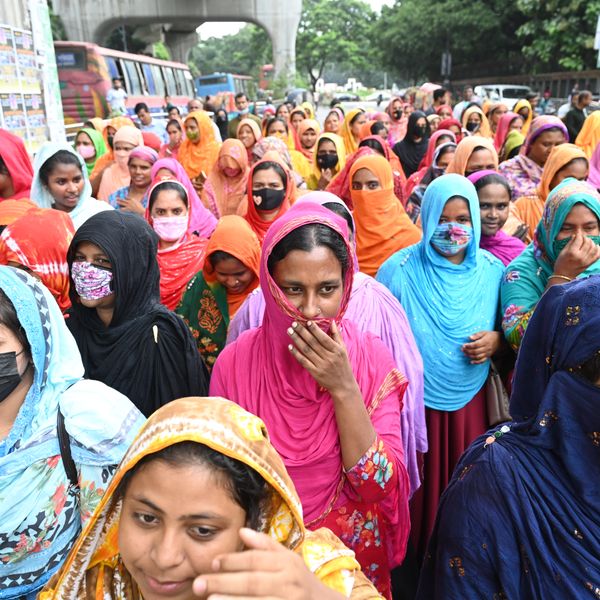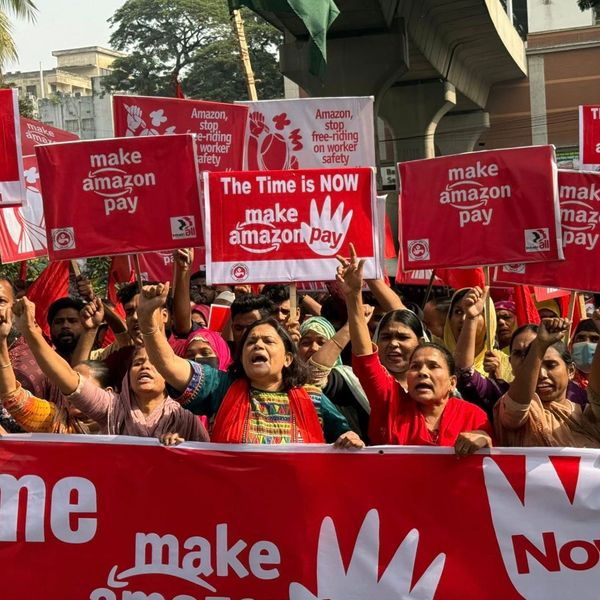Global Brands Refuse to Endorse 'Slaughter of the Amazon'
Meat companies sign a moratorium on cattle products linked to rainforest destruction
Four of the biggest companies involved in Brazilian cattle farming
have joined forces to stop the purchase of cattle from newly deforested
areas of the Amazon.
Meat companies Marfrig, Bertin,
JBS-Friboi and Minerva yesterday signed a formal moratorium in which
they pledge better protection for the rainforest.
The move follows a three-year Greenpeace investigation,
reported extensively in the Guardian in June, which exposed the link
between forest destruction and the expansion of cattle ranching in the
Amazon. The investigation prompted calls for action from key international companies, including food
group Princes and footwear manufacturers Clarkes, Adidas, Nike, and
Timberland, which threatened to cancel contracts unless their beef and
leather products were guaranteed free from raw materials linked to
Amazon destruction.
John Sauven, head of Greenpeace, said:
"Today's announcement is a significant victory in the fight to protect
the Amazon. Cattle ranching is the single biggest cause of deforestation
globally, and the fact that these multibillion dollar companies have
committed to cleaning up their supply chains will lead to real change
in the Amazon."
He added: "British companies have helped
make this happen by getting tough with their suppliers, but this is not
the end of the story. We now need to make sure that this agreement is
properly enforced and extended to the entire cattle industry in Brazil."
Blairo
Maggi, governor of the Brazilian state of Mato Grosso, which has the
highest rate of deforestation in the Amazon and the largest cattle herd
in Brazil, attended the signing in Sao Paulo. Maggi has announced the
state will support efforts to protect the Amazon and will provide
high-resolution satellite images to monitor the area.
Clearing tropical forests for agriculture is estimated to produce 17% of the world's greenhouse gas emissions - more than the global transport system.
The
Greenpeace investigation compiled government records, company documents
and trade data from Brazil, China, Europe, Vietnam and the US to piece
together the global movement of meat, leather and cosmetics ingredients
made from Brazilian cattle.
An Urgent Message From Our Co-Founder
Dear Common Dreams reader, The U.S. is on a fast track to authoritarianism like nothing I've ever seen. Meanwhile, corporate news outlets are utterly capitulating to Trump, twisting their coverage to avoid drawing his ire while lining up to stuff cash in his pockets. That's why I believe that Common Dreams is doing the best and most consequential reporting that we've ever done. Our small but mighty team is a progressive reporting powerhouse, covering the news every day that the corporate media never will. Our mission has always been simple: To inform. To inspire. And to ignite change for the common good. Now here's the key piece that I want all our readers to understand: None of this would be possible without your financial support. That's not just some fundraising cliche. It's the absolute and literal truth. We don't accept corporate advertising and never will. We don't have a paywall because we don't think people should be blocked from critical news based on their ability to pay. Everything we do is funded by the donations of readers like you. Will you donate now to help power the nonprofit, independent reporting of Common Dreams? Thank you for being a vital member of our community. Together, we can keep independent journalism alive when it’s needed most. - Craig Brown, Co-founder |
Four of the biggest companies involved in Brazilian cattle farming
have joined forces to stop the purchase of cattle from newly deforested
areas of the Amazon.
Meat companies Marfrig, Bertin,
JBS-Friboi and Minerva yesterday signed a formal moratorium in which
they pledge better protection for the rainforest.
The move follows a three-year Greenpeace investigation,
reported extensively in the Guardian in June, which exposed the link
between forest destruction and the expansion of cattle ranching in the
Amazon. The investigation prompted calls for action from key international companies, including food
group Princes and footwear manufacturers Clarkes, Adidas, Nike, and
Timberland, which threatened to cancel contracts unless their beef and
leather products were guaranteed free from raw materials linked to
Amazon destruction.
John Sauven, head of Greenpeace, said:
"Today's announcement is a significant victory in the fight to protect
the Amazon. Cattle ranching is the single biggest cause of deforestation
globally, and the fact that these multibillion dollar companies have
committed to cleaning up their supply chains will lead to real change
in the Amazon."
He added: "British companies have helped
make this happen by getting tough with their suppliers, but this is not
the end of the story. We now need to make sure that this agreement is
properly enforced and extended to the entire cattle industry in Brazil."
Blairo
Maggi, governor of the Brazilian state of Mato Grosso, which has the
highest rate of deforestation in the Amazon and the largest cattle herd
in Brazil, attended the signing in Sao Paulo. Maggi has announced the
state will support efforts to protect the Amazon and will provide
high-resolution satellite images to monitor the area.
Clearing tropical forests for agriculture is estimated to produce 17% of the world's greenhouse gas emissions - more than the global transport system.
The
Greenpeace investigation compiled government records, company documents
and trade data from Brazil, China, Europe, Vietnam and the US to piece
together the global movement of meat, leather and cosmetics ingredients
made from Brazilian cattle.
Four of the biggest companies involved in Brazilian cattle farming
have joined forces to stop the purchase of cattle from newly deforested
areas of the Amazon.
Meat companies Marfrig, Bertin,
JBS-Friboi and Minerva yesterday signed a formal moratorium in which
they pledge better protection for the rainforest.
The move follows a three-year Greenpeace investigation,
reported extensively in the Guardian in June, which exposed the link
between forest destruction and the expansion of cattle ranching in the
Amazon. The investigation prompted calls for action from key international companies, including food
group Princes and footwear manufacturers Clarkes, Adidas, Nike, and
Timberland, which threatened to cancel contracts unless their beef and
leather products were guaranteed free from raw materials linked to
Amazon destruction.
John Sauven, head of Greenpeace, said:
"Today's announcement is a significant victory in the fight to protect
the Amazon. Cattle ranching is the single biggest cause of deforestation
globally, and the fact that these multibillion dollar companies have
committed to cleaning up their supply chains will lead to real change
in the Amazon."
He added: "British companies have helped
make this happen by getting tough with their suppliers, but this is not
the end of the story. We now need to make sure that this agreement is
properly enforced and extended to the entire cattle industry in Brazil."
Blairo
Maggi, governor of the Brazilian state of Mato Grosso, which has the
highest rate of deforestation in the Amazon and the largest cattle herd
in Brazil, attended the signing in Sao Paulo. Maggi has announced the
state will support efforts to protect the Amazon and will provide
high-resolution satellite images to monitor the area.
Clearing tropical forests for agriculture is estimated to produce 17% of the world's greenhouse gas emissions - more than the global transport system.
The
Greenpeace investigation compiled government records, company documents
and trade data from Brazil, China, Europe, Vietnam and the US to piece
together the global movement of meat, leather and cosmetics ingredients
made from Brazilian cattle.

